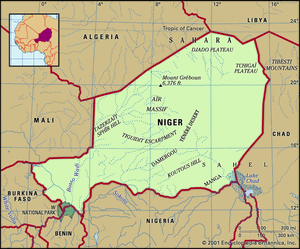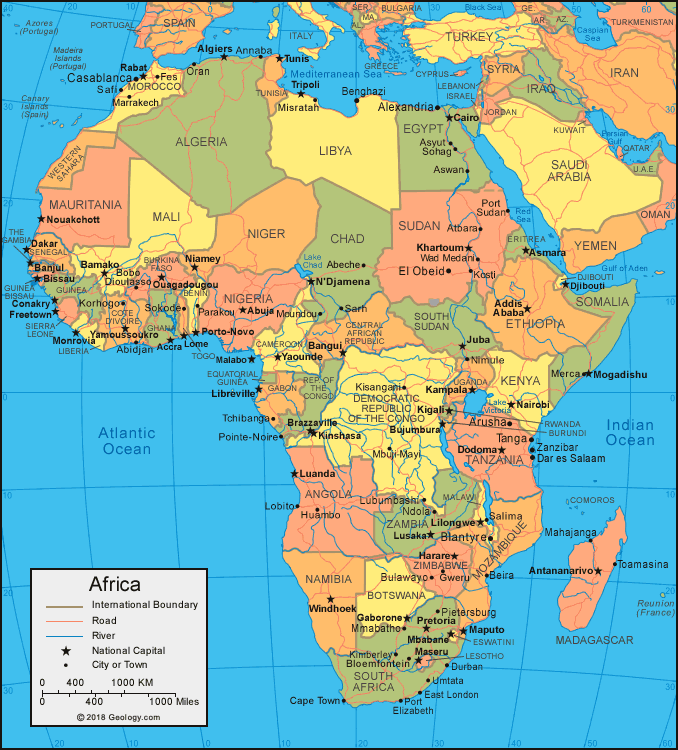Niger Political crisis
In the heart of West Africa, a nation faces a pivotal moment that has captured the world’s attention: Niger Republic, a country known for its role as a regional ally against the spread of extremist groups, is grappling with the aftermath of a recent military coup. Just over two weeks ago, the democratic order was upended as General Abdourahmane Tchiani and his military junta seized power, displacing the democratically elected President Mohamed Bazoum. This event set off a chain reaction of complex developments, drawing in both regional and international actors, each grappling to shape the course of events in a nation of 26 million people. The crisis has spurred vigorous debates on diplomacy, military intervention, and the delicate balance between safeguarding democratic principles and maintaining stability. As the world holds its breath, the situation in Niger unfolds with a unique blend of challenges, negotiations, and uncertainty
🗞️UPDATE: Niger Coup Leader Agrees to Dialogue with ECOWAS Amid Escalating Crisis
General Abdourahmane Tchiani, the leader behind the recent coup in Niger Republic, has taken a potentially pivotal step towards resolving the crisis. Agreeing to engage in dialogue with the Economic Community of West African States (ECOWAS), this decision comes after a crucial meeting between General Tchiani and a delegation of Nigerian Islamic scholars, led by Sheikh Abdullahi Bala Lau, the national leader of Jama’atu Izalatil Bid’ah Wa Iqamatus Sunnah (JIBWIS)

Prime Minister Ali Mahamane Lamine Zeine of Niger Republic confirmed General Tchiani’s willingness to enter discussions with ECOWAS. This development holds the promise of fruitful negotiations in the near future. “We have agreed, and the leader of our country has given the green light for dialogue,” shared Prime Minister Zeine. The delegation from Niger will return to Nigeria with the outcomes of the talks, facilitating further engagement.
The upcoming discussions between General Tchiani’s faction and ECOWAS representatives are expected to address the sanctions imposed on Niger Republic in the aftermath of the coup. The move towards diplomatic dialogue offers a potential pathway to reduce tensions and seek peaceful solutions for the restoration of democratic governance.
As details continue to unfold, the global community closely monitors the progress of these talks, hoping for a positive impact on the ongoing crisis. General Tchiani’s willingness to participate in dialogue brings a ray of hope to a region in need of stability. Further updates on this significant development are imminent.
🗞️Navigating Niger’s Latest Chapter
Approximately two weeks after the military coup that shook Niger, the coup leaders have taken a significant step by appointing Ali Mahaman Lamine Zeine, a former economy minister, as the nation’s new prime minister. The announcement was delivered through television by a spokesperson for the military junta on a Monday night.
Ali Mahaman Lamine Zeine’s history traces back to his role as the economy and finance minister in the cabinet of the ousted President Mamadou Tandja back in 2010. More recently, he has been contributing as an economist at the African Development Bank in Chad, as reported by a Nigerien media source.

The military’s takeover in late July resulted in the removal of democratically elected President Mohamed Bazoum and a suspension of the country’s constitution, impacting its 26 million population. Throughout Bazoum’s presidency, Niger played a pivotal role as a key Western ally in combating the spread of extremist groups in the Sahel region.
Meanwhile, the ECOWAS (Economic Community of West African States) ultimatum, which called for the reinstatement of President Bazoum, expired on Sunday without observable actions taken by the coup organizers.
Adding to the complexity, prime ministers representing ECOWAS member states are poised to convene in Abuja, Nigeria’s capital, on Thursday. The objective of this meeting is to deliberate and chart the course of action concerning the Niger situation.
Amid the ongoing coup developments in Niger, controversies and misinformation have swirled. False claims suggesting Algeria’s support for coup leaders if ECOWAS intervenes have surfaced, originating from an individual Twitter account. However, Algeria’s foreign ministry has officially contradicted this, affirming its recognition of Bazoum as Niger’s legitimate president.
A post circulating on social media garnered over 4,000 shares, purporting that “Algeria will support Niger in case of external military aggression,” accompanied by images of armored personnel carriers bearing Algerian flags. General Abdourahamane Tiani’s coup on July 26, which led to Bazoum’s detention, prompted ECOWAS, under Nigeria’s President Bola Tinubu’s leadership, to demand Bazoum’s reinstatement within a week.
Yet, Algeria’s foreign minister clarified on August 1, 2023, that the country recognizes Bazoum as Niger’s rightful leader. Algeria stressed the importance of peacefully restoring constitutional authority to prevent chaos, discouraging foreign military interventions that could exacerbate the crisis.
US Secretary of State Antony Blinken delved into the Niger crisis in a recent interview with BBC’s Focus on Africa. Blinken revealed his communication with deposed President Mohamed Bazoum, underlining the significance of reinstating the democratically elected government. Expressing concern about Russia’s potential role, Blinken highlighted the lack of concrete evidence confirming Russia’s involvement.
Blinken also cautioned against deploying Russia’s Wagner mercenary group to Niger, citing potential risks of casualties, destruction, exploitation, and heightened insecurity.
Blinken further critiqued Russia’s offer of free grain to six African countries, contrasting it with the stalled Black Sea Grain deal’s potential to provide 20 million tonnes of grain to low and middle-income nations. The US official questioned Russia’s response to the UN’s proposal to revive the Black Sea grain deal and emphasized that American sanctions exempt Russian wheat, grain, and shipping insurance.
As Niger grapples with intricate challenges, Blinken’s insights illuminate international dynamics and apprehensions surrounding Russia’s potential role.


